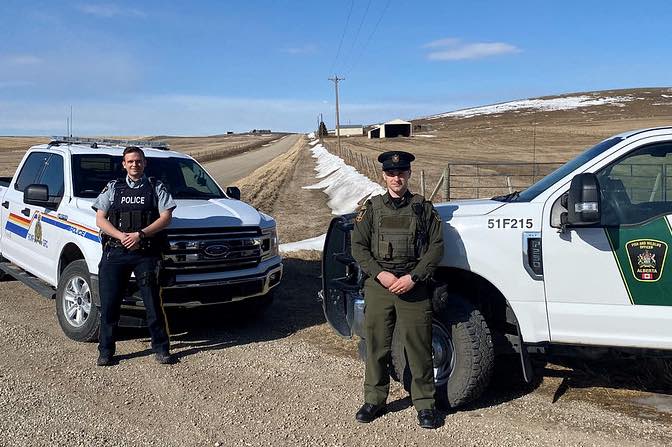Alberta
Alberta RCMP issue more than 2,000 tickets as part of #OperationImpact2023 safety campaign.

This Thanksgiving weekend, the Alberta RCMP along, with police forces across the country, participated in an annual initiative organized by the Canadian Association of Chiefs of Police focused on encouraging safety on Canadian Roads, #OperationImpact2023.
While patrolling Alberta’s provincial roads this Thanksgiving, Alberta RCMP issued more than 2,000 tickets.
Overall, 55 tickets were issued for distracted driving, 40 tickets were issued for seatbelt infractions, 15 tickets were issued for liquor offences, and 902 tickets were issued for speeding. Of the tickets issued for speeding, 12 of them were in excess of 50 km/h with one ticket being issued for a driver traveling 185 km/h. Immediate roadside sanctions were issued to 86 drivers who were found to be under the influence of drugs or alcohol resulting in driving suspensions and vehicle seizures.
To ensure that Albertans were complying with traffic safety rules, Evansburg RCMP partnered with Alberta Fish and Wildlife, Parkland County, and Alberta RCMP Traffic to conduct a check stop on October 6.
The Evansburg check stop checked approximately 700 vehicles over the course of the weekend. While only one motorist was found to be driving impaired, Evansburg RCMP did find drivers in possession of illegal drugs, illegal cigarettes, and several motorists driving without proper insurance or vehicle registration.
The Alberta RCMP would like to remind drivers that traffic safety is everyone’s responsibility and thank all those who helped keep themselves and others safe by following the rules of the road this Thanksgiving.
For more traffic safety information, please follow us on Facebook @RCMPinAlberta and Twitter @RCMPAlberta.
Alberta
Red Deer Justice Centre Grand Opening: Building access to justice for Albertans

The new Red Deer Justice Centre will help Albertans resolve their legal matters faster.
Albertans deserve to have access to a fair, accessible and transparent justice system. Modernizing Alberta’s courthouse infrastructure will help make sure Alberta’s justice system runs efficiently and meets the needs of the province’s growing population.
Alberta’s government has invested $191 million to build the new Red Deer Justice Centre, increasing the number of courtrooms from eight to 12, allowing more cases to be heard at one time.
“Modern, accessible courthouses and streamlined services not only strengthen our justice
system – they build safer, stronger communities across the province. Investing in the new Red Deer Justice Centre is vital to helping our justice system operate more efficiently, and will give people in Red Deer and across central Alberta better access to justice.”

Government of Alberta and Judiciary representatives with special guests at the Red Deer Justice Centre plaque unveiling event April 22, 2025.
On March 3, all court services in Red Deer began operating out of the new justice centre. The new justice centre has 12 courtrooms fully built and equipped with video-conference equipment to allow witnesses to attend remotely if they cannot travel, and vulnerable witnesses to testify from outside the courtroom.
The new justice centre also has spaces for people taking alternative approaches to the traditional courtroom trial process, with the three new suites for judicial dispute resolution services, a specific suite for other dispute resolution services, such as family mediation and civil mediation, and a new Indigenous courtroom with dedicated venting for smudging purposes.
“We are very excited about this new courthouse for central Alberta. Investing in the places where people seek justice shows respect for the rights of all Albertans. The Red Deer Justice Centre fills a significant infrastructure need for this rapidly growing part of the province. It is also an important symbol of the rule of law, meaning that none of us are above the law, and there is an independent judiciary to decide disputes. This is essential for a healthy functioning democracy.”
“Public safety and access to justice go hand in hand. With this investment in the new Red Deer Justice Centre, Alberta’s government is ensuring that communities are safer, legal matters are resolved more efficiently and all Albertans get the support they need.”
“This state-of-the-art facility will serve the people of Red Deer and surrounding communities for generations. Our team at Infrastructure is incredibly proud of the work done to plan, design and build this project. I want to thank everyone, at all levels, who helped make this project a reality.”
Budget 2025 is meeting the challenge faced by Alberta with continued investments in education and health, lower taxes for families and a focus on the economy.

Quick facts
- The new Red Deer Justice Centre is 312,000 sq ft (29,000 m2). (The old courthouse is 98,780 sq ft (9,177 m2)).
- The approved project funding for the Red Deer Justice Centre is about $191 million.
Alberta
Made in Alberta! Province makes it easier to support local products with Buy Local program

Show your Alberta side. Buy Local. |
When the going gets tough, Albertans stick together. That’s why Alberta’s government is launching a new campaign to benefit hard-working Albertans.
Global uncertainty is threatening the livelihoods of hard-working Alberta farmers, ranchers, processors and their families. The ‘Buy Local’ campaign, recently launched by Alberta’s government, encourages consumers to eat, drink and buy local to show our unified support for the province’s agriculture and food industry.
The government’s ‘Buy Local’ campaign encourages consumers to buy products from Alberta’s hard-working farmers, ranchers and food processors that produce safe, nutritious food for Albertans, Canadians and the world.
“It’s time to let these hard-working Albertans know we have their back. Now, more than ever, we need to shop local and buy made-in-Alberta products. The next time you are grocery shopping or go out for dinner or a drink with your friends or family, support local to demonstrate your Alberta pride. We are pleased tariffs don’t impact the ag industry right now and will keep advocating for our ag industry.”
Alberta’s government supports consumer choice. We are providing tools to help folks easily identify Alberta- and Canadian-made foods and products. Choosing local products keeps Albertans’ hard-earned dollars in our province. Whether it is farm-fresh vegetables, potatoes, honey, craft beer, frozen food or our world-renowned beef, Alberta has an abundance of fresh foods produced right on our doorstep.
Quick facts
- This summer, Albertans can support local at more than 150 farmers’ markets across the province and meet the folks who make, bake and grow our food.
- In March 2023, the Alberta government launched the ‘Made in Alberta’ voluntary food and beverage labelling program to support local agriculture and food sectors.
- Through direct connections with processors, the program has created the momentum to continue expanding consumer awareness about the ‘Made in Alberta’ label to help shoppers quickly identify foods and beverages produced in our province.
- Made in Alberta product catalogue website
Related information
-

 2025 Federal Election2 days ago
2025 Federal Election2 days agoBREAKING: THE FEDERAL BRIEF THAT SHOULD SINK CARNEY
-

 Media2 days ago
Media2 days agoCBC retracts false claims about residential schools after accusing Rebel News of ‘misinformation’
-

 2025 Federal Election2 days ago
2025 Federal Election2 days agoCHINESE ELECTION THREAT WARNING: Conservative Candidate Joe Tay Paused Public Campaign
-

 Business2 days ago
Business2 days ago‘Great Reset’ champion Klaus Schwab resigns from WEF
-

 Bjorn Lomborg2 days ago
Bjorn Lomborg2 days agoNet zero’s cost-benefit ratio is CRAZY high
-

 Business23 hours ago
Business23 hours agoTrump: China’s tariffs to “come down substantially” after negotiations with Xi
-

 International2 days ago
International2 days agoPope Francis’ funeral to take place Saturday
-

 Business23 hours ago
Business23 hours agoTrump considers $5K bonus for moms to increase birthrate




